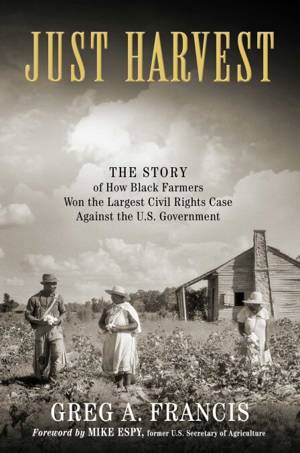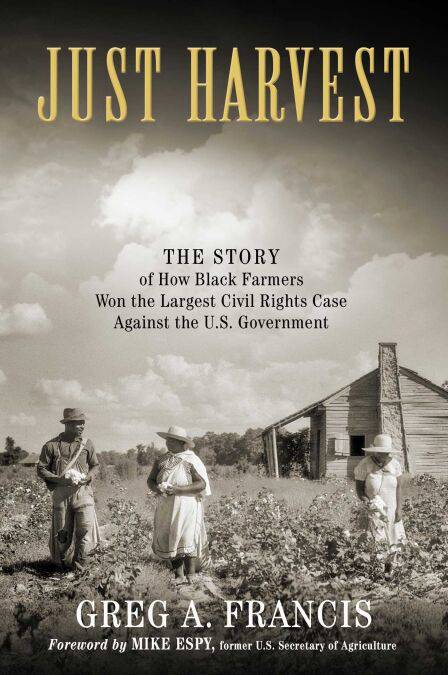
Bedankt voor het vertrouwen het afgelopen jaar! Om jou te bedanken bieden we GRATIS verzending (in België) aan op alles gedurende de hele maand januari.
- Afhalen na 1 uur in een winkel met voorraad
- In januari gratis thuislevering in België
- Ruim aanbod met 7 miljoen producten
Bedankt voor het vertrouwen het afgelopen jaar! Om jou te bedanken bieden we GRATIS verzending (in België) aan op alles gedurende de hele maand januari.
- Afhalen na 1 uur in een winkel met voorraad
- In januari gratis thuislevering in België
- Ruim aanbod met 7 miljoen producten
Zoeken
Just Harvest E-BOOK
The Story of How Black Farmers Won the Largest Civil Rights Case against the U.S. Government
Greg Francis
E-book | Engels
€ 15,65
+ 15 punten
Omschrijving
When a class-action lawsuit against the US government results in a billion dollar settlement for the aggrieved parties, you’d expect the story to be headline news . . .to be posted on social media everywhere . . . to be adapted to film or even to a popular legal procedural series on TV . . .
So why then have so many people never heard of Pigford vs. Glickman?
Or the follow-up lawsuit, Pigford II?
Or the Black Farmers Case, as the pair of these legal actions is often called?
Could it be that the heart-wrenching story of Black farmers in America, and the monumental legal case that brought long-sought justice to them, is rarely told because it reflects so poorly on the US and its treatment of those whose ancestors helped make the nation an agricultural giant in the first place?
Whatever the reason, the time to tell the full story has come and the person to share the gripping details is Greg Francis, one of the lead counsels in the historic case that finally helped Black farmers achieve equity. In Just Harvest, Francis narrates the dramatic twists and turns of the legal battle fought and won, and evidences the many years of ingrained discrimination and racism that preceded it. Awareness of this story makes us all witnesses to the history still unfolding— and while parts of what is recounted herein will enrage you, the hope is that this book will also inspire, inform, and motivate you to join the continuing fight for the rights of all Black farmers now and in the future.
So why then have so many people never heard of Pigford vs. Glickman?
Or the follow-up lawsuit, Pigford II?
Or the Black Farmers Case, as the pair of these legal actions is often called?
Could it be that the heart-wrenching story of Black farmers in America, and the monumental legal case that brought long-sought justice to them, is rarely told because it reflects so poorly on the US and its treatment of those whose ancestors helped make the nation an agricultural giant in the first place?
Whatever the reason, the time to tell the full story has come and the person to share the gripping details is Greg Francis, one of the lead counsels in the historic case that finally helped Black farmers achieve equity. In Just Harvest, Francis narrates the dramatic twists and turns of the legal battle fought and won, and evidences the many years of ingrained discrimination and racism that preceded it. Awareness of this story makes us all witnesses to the history still unfolding— and while parts of what is recounted herein will enrage you, the hope is that this book will also inspire, inform, and motivate you to join the continuing fight for the rights of all Black farmers now and in the future.
Specificaties
Betrokkenen
- Auteur(s):
- Uitgeverij:
Inhoud
- Aantal bladzijden:
- 224
- Taal:
- Engels
Eigenschappen
- Productcode (EAN):
- 9781948677813
- Verschijningsdatum:
- 17/05/2021
- Uitvoering:
- E-book
- Beveiligd met:
- Adobe DRM
- Formaat:
- ePub

Alleen bij Standaard Boekhandel
+ 15 punten op je klantenkaart van Standaard Boekhandel
Beoordelingen
We publiceren alleen reviews die voldoen aan de voorwaarden voor reviews. Bekijk onze voorwaarden voor reviews.









